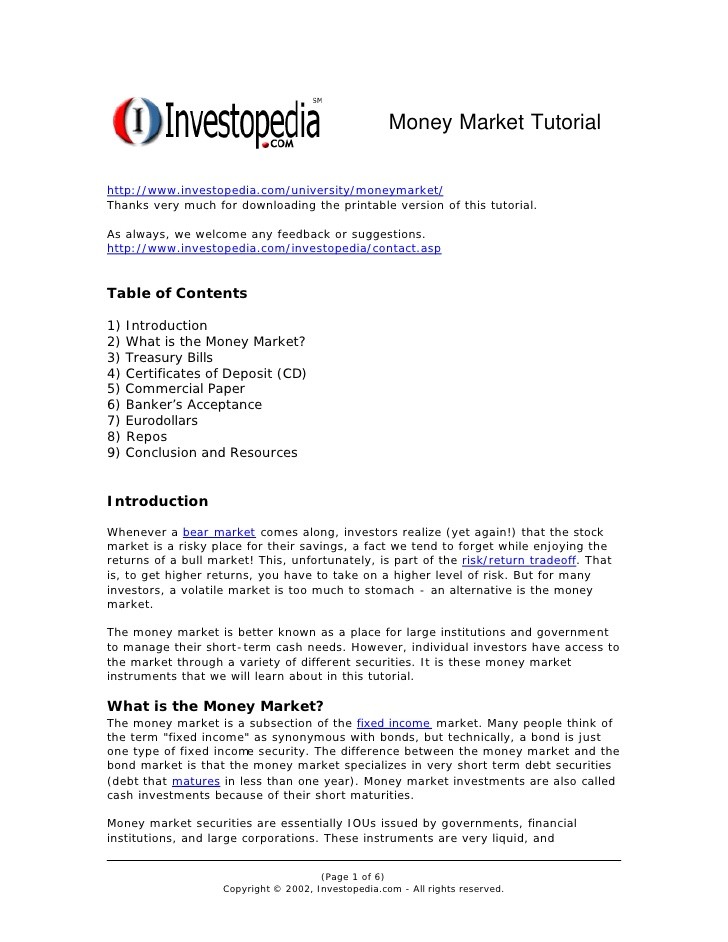What s the difference between money market accounts and money market funds
Post on: 7 Май, 2015 No Comment

Published on Thu Oct 28, 2010
By Sierra Black
Make sure you understand the difference between a money market account and a money market fund, so you can invest your savings in the right one.
Money market accounts and money market funds can be confusing. The names are similar, but these financial products are really quite different. The distinction can confuse beginning investors. Many simply shy away from money markets altogether because they sound too confusing.
Both money market accounts and money market funds deal in the same type of investments: money. Money markets create the liquidity in the global finance system. They’re the short-term trading of treasury bills, banker’s acceptances, commercial paper, CDs and short-term securities. Passing these things around keeps cash flowing in the financial markets.
Both money market accounts and money market funds are typically safe investments, with stable returns and small risks. They do have important differences, though, that are important for investors to understand.
What is a money market account?
A money market account is a pretty straightforward account. It’s one that can be a valuable tool in your financial toolbox. For example, a money market account is often a great place to keep your emergency fund.
A money market account is an interest-bearing bank account. Like a savings account, a money market account is considered a secure investment. Money market accounts are FDIC-insured just like your regular checking and savings accounts and CDs. Your initial investment and your interest earnings are not at risk in a money market account.
Unlike with a CD, however, money market account interest rates are not guaranteed. They can fluctuate up or down, and if they remain low for a long time your money might not keep up with the rate of inflation.
How is a money market account different from a savings account?
Money market accounts differ from regular savings accounts in a few important ways:
- They offer higher interest rates. Money market account interest rates can be more than double the interest rates on conventional savings accounts.
- They require high minimum balances. To open or maintain a money market account, you typically need an opening balance in the thousands of dollars. A $2,500 minimum balance is common. Some high interest money market accounts require as much as $10,000 for an opening balance.
- Money market accounts limit the number of withdrawals you can make each month. Unlike a savings account, most money market accounts allow you to write a few checks against your balance each month. But if you make too many withdrawals, you can face penalty charges or a lowered interest rate.
Money market accounts are ideal for building up savings at a solid interest rate. They’re also useful for targeted savings funds. I use one for my child’s tuition savings and for our mortgage payments. I make only a few withdrawals a year from the tuition account, and the money earns a solid rate of return while being safely stored until those tuition bills come due.
What is a money market fund?
While a money market account is a bank account, a money market fund is a type of low-risk mutual fund. Unlike a money market account, a money market fund is not FDIC-insured. That means that you can lose your capital investment, as well as your anticipated earnings on it.
That said, losses in money market funds are extremely rare. They are tightly regulated by the SEC. and aim to limit exposure for investors. The goal of money market funds is maintain a stable $1 net asset value. Falling below $1 is referred to as breaking the buck; when this happens, investors lose money. Since money market funds were first launched in 1971, only three funds have broken the buck. Two of these instances occurred after the financial collapse of September, 2008.
You’ll get a better return on your money in a money market fund than you will in a traditional savings account, but you won’t see the kind of gains you get from investing in the stock market through conventional mutual funds or the like. Since a money market fund requires you to give up the solid protection of FDIC insurance on your deposits, it may not be worthwhile for the comparatively small interest rate advantage.
How to choose a money market investment
Your local bank almost certainly offers money market accounts, but it’s worth your while to shop around for the best interest rate. Just like with savings accounts, money market interest rates can vary widely. In some cases you’ll find a better rate with a high-yield savings account at an online bank than you will with your local bank’s money market accounts.
Bottom line: it’s the interest rate that matters. Whether you use an online high-interest savings account, a money market account or a CD, you want to get the best return on your money.
Money market accounts have some great features. The flexibility of depositing money whenever you want combined with the limits on withdrawing it make them great savings vehicles, especially if you’re prone to impulse spending. They’re easy to manage alongside your regular savings and checking accounts, and pay a solid interest rate. For your emergency fund or other short-term cash savings, a money market account might well be the perfect tool.














